by Jack Kornfield:
There are no holy places and no holy people, only holy moments, only moments of wisdom.
Saturday, September 27, 2008
Wednesday, September 24, 2008
from Buddha's Little Instruction Book
by Jack Kornfield:
Do not judge yourself harshly. Without mercy for ourselves we cannot love the world.
Do not judge yourself harshly. Without mercy for ourselves we cannot love the world.
Sunday, September 21, 2008
Flying
I had a flying dream last night. I hadn't had one of those in a long while.
I think the dream was instigated by watching Peter and the Wolf on PBS last night. In the tale, a delightful little bird has trouble flying and Peter ties a helium balloon around its breast. The bird hopped, bounced, and sometimes soared. That is exactly what my flying dreams are like: I hop and bounce like I'm attached to a balloon that isn't quite large enough to get me off the ground. But after a few false starts, I soar. Sometimes I just float; other times, like in last night's dream, I hold my arms out like airplane wings.
In last night's dream, the air was filled with people flying.
I think the dream was instigated by watching Peter and the Wolf on PBS last night. In the tale, a delightful little bird has trouble flying and Peter ties a helium balloon around its breast. The bird hopped, bounced, and sometimes soared. That is exactly what my flying dreams are like: I hop and bounce like I'm attached to a balloon that isn't quite large enough to get me off the ground. But after a few false starts, I soar. Sometimes I just float; other times, like in last night's dream, I hold my arms out like airplane wings.
In last night's dream, the air was filled with people flying.
Saturday, September 20, 2008
Starting from the Lowest Possible Place
"I must lie down where all the ladders start," wrote Yeats in The Circus Animals' Desertion, "In the foul rag and bone shop of the heart."
This poem, one of his last, shows a poet searching for inspiration. The speaker concludes it may be found not in the beauty of the heart's core but within "a mound of refuse or the sweepings of a street, / Old kettles, old bottles, and a broken can, / Old iron, old bones, old rags ..."
In this stanza, Yeats reveals an important life truth. It is one he has explored before; In his poem, The Coming of Wisdom with Time, Yeats wrote that "leaves are many" but "the root is one." As a youth, the speaker "swayed my leaves and flowers in the sun" but now says it may be time to "wither into the truth." No matter how showy the leaves, the root that taps the earth for water and nourishment is the true place. It is also a dark place.
In both poems, Yeats rejects the romanticism of his earlier work. As he wrote in a letter to Lady Gregory: "We must accept the baptism of the gutter." The human condition need not be transcended if one learns to accept it with gusto.
Years later, the poet Theodore Roethke would also recognize that his most masterful poetry came from a primal place. Roethke, like Yeats, wanted to achieve human sanctity. In Roethke's mature work, inspiration often came from the most lowly of places, such as when he wrote of the worm climbing up the winding stair. Nature might also be menacing as in his poem Orchids:
They lean over the path,
Adder-mouthed,
Swaying close to the face,
Coming out, soft and deceptive,
Limp and damp, delicate as a young bird's tongue;
Their fluttery fledgling lips
Move slowly,
Drawing in the warm air.
In the second stanza, the orchids are described as "So many devouring infants" with "Lips neither dead nor alive" and "Loose ghostly mouths / Breathing."
Yeats's baptism of the gutter is made real in Roethke's poem Cuttings (later):
This urge, wrestle, resurrection of dry sticks,
Cut stems struggling to put down feet,
What saint strained so much,
Rose on such lopped limbs to a new life?
I can hear, underground, that sucking and sobbing,
In my veins, in my bones I feel it, --
The small waters seeping upward,
The tight grains parting at last.
When sprouts break out,
Slippery as fish,
I quail, lean to beginnings, sheath-wet.
The second stanza is lusty. It mirrors Yeats's thought that if we can accept the limitations of life boldly, we will find inspiration aplenty. Yeats said that such acceptance allows us to come into our "force."
We come into our strength as artists and as people when we quit trying to transform ugliness into beauty. Ugliness is what it is. Learn to live with it. Lift it up. Study and reveal it. Let it give you life, just as beauty does.
This poem, one of his last, shows a poet searching for inspiration. The speaker concludes it may be found not in the beauty of the heart's core but within "a mound of refuse or the sweepings of a street, / Old kettles, old bottles, and a broken can, / Old iron, old bones, old rags ..."
In this stanza, Yeats reveals an important life truth. It is one he has explored before; In his poem, The Coming of Wisdom with Time, Yeats wrote that "leaves are many" but "the root is one." As a youth, the speaker "swayed my leaves and flowers in the sun" but now says it may be time to "wither into the truth." No matter how showy the leaves, the root that taps the earth for water and nourishment is the true place. It is also a dark place.
In both poems, Yeats rejects the romanticism of his earlier work. As he wrote in a letter to Lady Gregory: "We must accept the baptism of the gutter." The human condition need not be transcended if one learns to accept it with gusto.
Years later, the poet Theodore Roethke would also recognize that his most masterful poetry came from a primal place. Roethke, like Yeats, wanted to achieve human sanctity. In Roethke's mature work, inspiration often came from the most lowly of places, such as when he wrote of the worm climbing up the winding stair. Nature might also be menacing as in his poem Orchids:
They lean over the path,
Adder-mouthed,
Swaying close to the face,
Coming out, soft and deceptive,
Limp and damp, delicate as a young bird's tongue;
Their fluttery fledgling lips
Move slowly,
Drawing in the warm air.
In the second stanza, the orchids are described as "So many devouring infants" with "Lips neither dead nor alive" and "Loose ghostly mouths / Breathing."
Yeats's baptism of the gutter is made real in Roethke's poem Cuttings (later):
This urge, wrestle, resurrection of dry sticks,
Cut stems struggling to put down feet,
What saint strained so much,
Rose on such lopped limbs to a new life?
I can hear, underground, that sucking and sobbing,
In my veins, in my bones I feel it, --
The small waters seeping upward,
The tight grains parting at last.
When sprouts break out,
Slippery as fish,
I quail, lean to beginnings, sheath-wet.
The second stanza is lusty. It mirrors Yeats's thought that if we can accept the limitations of life boldly, we will find inspiration aplenty. Yeats said that such acceptance allows us to come into our "force."
We come into our strength as artists and as people when we quit trying to transform ugliness into beauty. Ugliness is what it is. Learn to live with it. Lift it up. Study and reveal it. Let it give you life, just as beauty does.
Labels:
Modern Poetry,
poetry,
Theodore Roethke,
William Butler Yeats
Monday, September 15, 2008
"The Self-Unseeing"
"The Self-Unseeing" is a poem by Thomas Hardy (1840-1928). Tomorrow in Modern Poetry, we are going to take a look at a couple of Hardy's poems, but not "The Self-Unseeing"--it just didn't make it into the syllabus this time around.
"The Self-Unseeing" is about transience and how this transience haunts moments of happiness.
The Self-Unseeing
Here is the ancient floor,
Footworn and hollowed and thin,
Here was the former door
Where the dead feet walked in.
She sat here in her chair,
Smiling into the fire;
He who played stood there,
Bowing it higher and higher.
Childlike, I danced in a dream;
Blessings emblazoned that day;
Everything glowed with a gleam;
Yet we were looking away!
The speaker remembers a moment of profound blessing which was, at the time, unappreciated.
Is the poem a reminder to live in the moment, to count one's blessings as they occur?
I don't think so. Hardy's speaker seems to believe that, because we cannot know the future or imagine ourselves in a future time, we can never fully understand our blessings as they occur. Full understanding comes only afterwards and when it is too late. Thus life is sad and full of regret. That is just the way things are.
While things glow and gleam, we are looking away.
"The Self-Unseeing" is about transience and how this transience haunts moments of happiness.
The Self-Unseeing
Here is the ancient floor,
Footworn and hollowed and thin,
Here was the former door
Where the dead feet walked in.
She sat here in her chair,
Smiling into the fire;
He who played stood there,
Bowing it higher and higher.
Childlike, I danced in a dream;
Blessings emblazoned that day;
Everything glowed with a gleam;
Yet we were looking away!
The speaker remembers a moment of profound blessing which was, at the time, unappreciated.
Is the poem a reminder to live in the moment, to count one's blessings as they occur?
I don't think so. Hardy's speaker seems to believe that, because we cannot know the future or imagine ourselves in a future time, we can never fully understand our blessings as they occur. Full understanding comes only afterwards and when it is too late. Thus life is sad and full of regret. That is just the way things are.
While things glow and gleam, we are looking away.
Thursday, September 11, 2008
The Girl Who Trod on the Loaf, Part III
I just noticed that what I wrote in the previous entry could be a poem:
The Path to Transformation
Negotiate the dark places in your life.
Fail. Make rotten choices.
Be as selfish as you want to be.
Hit rock bottom.
Turn to stone.
Become a statue in some devil's antechamber.
Hunger. Thirst. Never be satisfied.
Oh how you suffer,
but tears won't come.
Resist.
Resist.
Resist.
Transformation doesn't happen in an instant.
Becoming something else is hard.
Do what comes natural:
Harden your heart, blame others.
This will take a long time.
Hard to believe,
but one day you'll encounter grace.
Hard to believe,
but someone's out there,
really,
someone's out there,
who will not judge you.
Only then will you change,
be one with the sun.
You will be love.
The Path to Transformation
Negotiate the dark places in your life.
Fail. Make rotten choices.
Be as selfish as you want to be.
Hit rock bottom.
Turn to stone.
Become a statue in some devil's antechamber.
Hunger. Thirst. Never be satisfied.
Oh how you suffer,
but tears won't come.
Resist.
Resist.
Resist.
Transformation doesn't happen in an instant.
Becoming something else is hard.
Do what comes natural:
Harden your heart, blame others.
This will take a long time.
Hard to believe,
but one day you'll encounter grace.
Hard to believe,
but someone's out there,
really,
someone's out there,
who will not judge you.
Only then will you change,
be one with the sun.
You will be love.
The Girl Who Trod on the Loaf, Part II
Tonight in English 200 we discussed "The Girl Who Trod on the Loaf." Phrases of conversation that stand out for me now: "hitting rock bottom" and "going through the dark places."
Inger must negotiate the dark moments of her life. She must hit rock bottom before she can begin her transformation into something better, something higher. Inger is transformed from a self-absorbed adolescent to a person capable of empathy.
Karma. Her selfishness has turned her stone, into a person who hungers and thirsts but cannot be filled; a person who wants to cry but cannot. We rarely experience instant transformation. Change is hard and usually resisted. Old habits and beliefs are comforting. For over a hundred years, she continues to harden her heart, to blame others.
Finally she is released from her self-constructed prison through the grace of another person: a person who does not judge Inger but who instead empathizes with her, admitting her own frailties.
Inger sheds her obsession with beauty and clothes and attends to the state of her soul. She becomes part of the sun: something bigger than herself, more beautiful than strutting around in beautiful clothes. She is love.
Inger must negotiate the dark moments of her life. She must hit rock bottom before she can begin her transformation into something better, something higher. Inger is transformed from a self-absorbed adolescent to a person capable of empathy.
Karma. Her selfishness has turned her stone, into a person who hungers and thirsts but cannot be filled; a person who wants to cry but cannot. We rarely experience instant transformation. Change is hard and usually resisted. Old habits and beliefs are comforting. For over a hundred years, she continues to harden her heart, to blame others.
Finally she is released from her self-constructed prison through the grace of another person: a person who does not judge Inger but who instead empathizes with her, admitting her own frailties.
Inger sheds her obsession with beauty and clothes and attends to the state of her soul. She becomes part of the sun: something bigger than herself, more beautiful than strutting around in beautiful clothes. She is love.
Sunday, September 07, 2008
The Girl Who Trod on the Loaf, Part I
"The Girl Who Trod on the Loaf" is a curious tale written by Hans Christian Anderson. It is called a literary tale because it was created from the imagination of one writer; it is not a folk tale handed down through time and retellings. Quite a few interpretations and controversies surround the tale.
It is the story Inger, a girl who is pretty and poor and proud and arrogant. She tears the wings off flies and skewers beetles on a pin. As she grows older, her self-absorbtion grows worse. She goes away to be a servant for people of means. They spoil her with fine clothes.
One day Inger's mistress tells her she should visit her poor mother. But Inger is ashamed when she sees her mother's poverty and turns away. A half year goes by. Inger's mistress tells her again she should visit her home. The mistress gives Inger a loaf of bread to take to her parents.
Inger puts on her best dress and new shoes. While walking she finds herself on a muddy path. She throws the bread into the mud and uses the bread to keep her shoes dry and clean.
But the loaf sinks and carries her down to the home of the Marsh Woman, a place that is little more than a congregation of stinks and slime: "Every vessel is reeking with horrible smells that would turn a human being faint, and they are packed closely together; but even if there were enough space between them to creep through, it would be impossible because of the slimy toads and the fat snakes that are creeping and slithering along."
One day the devil and his great-grandmother visit the Marsh Woman. The devil's great grandmother sees Inger and wants her as a souvenir: "She will make a suitable statue in my great-grandchildren's antechamber."
So little Inger goes to hell.
And so Inger becomes a statue in "an endless antechamber. It made one dizzy to look forward and dizzy to look backward, and there was a crowd of anxious, exhausted people waiting for the gates of mercy to be opened for them. They would have long to wait. Huge, hideous, fat spiders spun cobwebs, of thousands of years' lasting, over their feet, webs like foot screws or manacles, which held them like copper chains; besides this, every soul was filled with everlasting unrest, an unrest of torment and pain."
Inger could hear people on earth talking about her, about what a horrible child she had been. And Inger thinks her parents should have brought her up better. "They should have beaten the nonsense out of he, if I had any," she thinks. People made up a song about her, "the haughty girl who stepped on a loaf to keep her shoes clean." She hears her mother's anguish at having such an awful child.
Through all this, Inger's heart becomes harder and full of hatred "for all mankind." She thinks about her own suffering.
Because Inger is a statue, she cannot eat, but she suffers from terrible hunger and misery. One day she hears a little girl burst into tears at the thought of Inger. This pity reaches into Inger's heart "and seemed almost to make her good." But Inger, who wants to weep, cannot. The tears will not come, "and that was also a torture."
Years pass. Inger is not talked about so much, but Inger does hear the dying words of her mother: "Inger, Inger, how miserable you have made me! I knew that you would!" And the little girl who had once cried for Inger had become an old woman. The old woman's tears and prayers come "like an echo down to the hollow, empty shape" that held Inger's soul. The old woman prays: "My Lord, have I not often, like poor Inger, trampled underfoot your blessed gifts and counted them of no value? Have I not often been guilty of the sin of pride and vanity in my inmost heart? But in Your mercy You did not let me sink into the abyss, but did sustain me."
Inger's soul takes account of its earthly life, and now Inger cries as she never had cried before. She feels humble and then a bright ray penetrates down into the abyss, a ray "more powerful than the sunbeams that melt the snowmen that boys make in their yards." The statue of Inger evaporates, and a tiny bird arises and follows the ray up into the world.
Terrified, shy, and ashamed, the bird hides herself in a dark hole in a crumbling wall. The bird has no voice. Gradually she is comforted by the soft air, the clear moon, and the sweet trees and flowers. Her feathers feel clean, and she experiences how "all creation spoke of love and beauty." She wanted to sing her thoughts, but could not. For weeks, Inger's gratitude increased, and she decides to perform a good deed.
On Christmas morning, a farmer sat up a pole and tied to it a bundle of oats so that the birds might eat. At last Inger's swelling thoughts find a voice. From the hiding place comes a faint "tweet, tweet."
During the cold, harsh winter, Inger flies, searching for bread crumbs that have been strewn for birds to eat. She gathers the crumbs, eating only a single crumb: the rest she gives away. By the end of the winter, she had given away enough crumbs to equal the weight of the loaf she had stepped on to keep her shoes from being soiled. And when she had given away her last crumb, her gray wings became white and expanded.
Children saw Inger. "Look," they said, "there flies a sea swallow over the sea." Inger rises into the bright sunshine. She gleams in the air. The story ends: "It was not possible to see what became of [the bird]; they said that it flew straight into the sun."
In my next entry I would like to explore possible meanings of this tale.
It is the story Inger, a girl who is pretty and poor and proud and arrogant. She tears the wings off flies and skewers beetles on a pin. As she grows older, her self-absorbtion grows worse. She goes away to be a servant for people of means. They spoil her with fine clothes.
One day Inger's mistress tells her she should visit her poor mother. But Inger is ashamed when she sees her mother's poverty and turns away. A half year goes by. Inger's mistress tells her again she should visit her home. The mistress gives Inger a loaf of bread to take to her parents.
Inger puts on her best dress and new shoes. While walking she finds herself on a muddy path. She throws the bread into the mud and uses the bread to keep her shoes dry and clean.
But the loaf sinks and carries her down to the home of the Marsh Woman, a place that is little more than a congregation of stinks and slime: "Every vessel is reeking with horrible smells that would turn a human being faint, and they are packed closely together; but even if there were enough space between them to creep through, it would be impossible because of the slimy toads and the fat snakes that are creeping and slithering along."
One day the devil and his great-grandmother visit the Marsh Woman. The devil's great grandmother sees Inger and wants her as a souvenir: "She will make a suitable statue in my great-grandchildren's antechamber."
So little Inger goes to hell.
And so Inger becomes a statue in "an endless antechamber. It made one dizzy to look forward and dizzy to look backward, and there was a crowd of anxious, exhausted people waiting for the gates of mercy to be opened for them. They would have long to wait. Huge, hideous, fat spiders spun cobwebs, of thousands of years' lasting, over their feet, webs like foot screws or manacles, which held them like copper chains; besides this, every soul was filled with everlasting unrest, an unrest of torment and pain."
Inger could hear people on earth talking about her, about what a horrible child she had been. And Inger thinks her parents should have brought her up better. "They should have beaten the nonsense out of he, if I had any," she thinks. People made up a song about her, "the haughty girl who stepped on a loaf to keep her shoes clean." She hears her mother's anguish at having such an awful child.
Through all this, Inger's heart becomes harder and full of hatred "for all mankind." She thinks about her own suffering.
Because Inger is a statue, she cannot eat, but she suffers from terrible hunger and misery. One day she hears a little girl burst into tears at the thought of Inger. This pity reaches into Inger's heart "and seemed almost to make her good." But Inger, who wants to weep, cannot. The tears will not come, "and that was also a torture."
Years pass. Inger is not talked about so much, but Inger does hear the dying words of her mother: "Inger, Inger, how miserable you have made me! I knew that you would!" And the little girl who had once cried for Inger had become an old woman. The old woman's tears and prayers come "like an echo down to the hollow, empty shape" that held Inger's soul. The old woman prays: "My Lord, have I not often, like poor Inger, trampled underfoot your blessed gifts and counted them of no value? Have I not often been guilty of the sin of pride and vanity in my inmost heart? But in Your mercy You did not let me sink into the abyss, but did sustain me."
Inger's soul takes account of its earthly life, and now Inger cries as she never had cried before. She feels humble and then a bright ray penetrates down into the abyss, a ray "more powerful than the sunbeams that melt the snowmen that boys make in their yards." The statue of Inger evaporates, and a tiny bird arises and follows the ray up into the world.
Terrified, shy, and ashamed, the bird hides herself in a dark hole in a crumbling wall. The bird has no voice. Gradually she is comforted by the soft air, the clear moon, and the sweet trees and flowers. Her feathers feel clean, and she experiences how "all creation spoke of love and beauty." She wanted to sing her thoughts, but could not. For weeks, Inger's gratitude increased, and she decides to perform a good deed.
On Christmas morning, a farmer sat up a pole and tied to it a bundle of oats so that the birds might eat. At last Inger's swelling thoughts find a voice. From the hiding place comes a faint "tweet, tweet."
During the cold, harsh winter, Inger flies, searching for bread crumbs that have been strewn for birds to eat. She gathers the crumbs, eating only a single crumb: the rest she gives away. By the end of the winter, she had given away enough crumbs to equal the weight of the loaf she had stepped on to keep her shoes from being soiled. And when she had given away her last crumb, her gray wings became white and expanded.
Children saw Inger. "Look," they said, "there flies a sea swallow over the sea." Inger rises into the bright sunshine. She gleams in the air. The story ends: "It was not possible to see what became of [the bird]; they said that it flew straight into the sun."
In my next entry I would like to explore possible meanings of this tale.
Saturday, September 06, 2008
Library Dreams
I've been having a lot of dreams lately about libraries. Last night I had such a dream. The library was very old. It had wooden elevators and walls stained from rain leaking through the roof. But the books this library had! Tall, never-ending shelves of books, beautiful old editions of art books.
Allen was with me. There was also a child, a baby, that was ours. It was not yet a year old but he could talk and recited beautiful poetry, quite to my surprise. Surprising, too, was the fact that we even had a child--at our age!
Allen was with me. There was also a child, a baby, that was ours. It was not yet a year old but he could talk and recited beautiful poetry, quite to my surprise. Surprising, too, was the fact that we even had a child--at our age!
Subscribe to:
Comments (Atom)
Pages
Dreaming
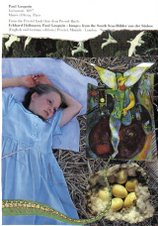
About Me

- Theresa Williams
- Northwest Ohio, United States
- "I was no better than dust, yet you cannot replace me. . . Take the soft dust in your hand--does it stir: does it sing? Has it lips and a heart? Does it open its eyes to the sun? Does it run, does it dream, does it burn with a secret, or tremble In terror of death? Or ache with tremendous decisions?. . ." --Conrad Aiken
Followers
Facebook Badge
Search This Blog
Favorite Lines
My Website
Epistle, by Archibald MacLeish
Visit my Channel at YouTube
Great Artists
www.flickr.com
This is a Flickr badge showing public photos from theresarrt7. Make your own badge here.
Fave Painting: Eden
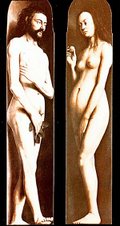
Fave Painting: The Three Ages of Man and Death

by Albrecht Dürer
From the First Chapter
The Secret of Hurricanes : That article in the Waterville Scout said it was Shake- spearean, all that fatalism that guides the Kennedys' lives. The likelihood of untimely death. Recently, another one died in his prime, John-John in an airplane. Not long before that, Bobby's boy. While playing football at high speeds on snow skis. Those Kennedys take some crazy chances. I prefer my own easy ways. Which isn't to say my life hasn't been Shake-spearean. By the time I was sixteen, my life was like the darkened stage at the end of Hamlet or Macbeth. All littered with corpses and treachery.
My Original Artwork: Triptych
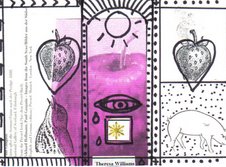
Wishing
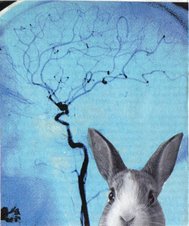
Little Deer
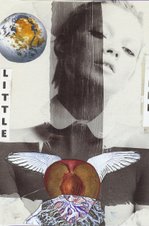
Transformation
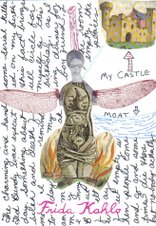
Looking Forward, Looking Back
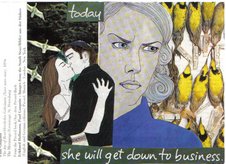
CURRENT MOON
Labels
- adolescence (1)
- Airstream (7)
- Alain de Botton (1)
- all nighters (2)
- Allen (1)
- altars (1)
- Angelus Silesius (2)
- animals (1)
- Annie Dillard (1)
- Antonio Machado (2)
- AOL Redux (1)
- April Fool (1)
- Archibald MacLeish (1)
- arts and crafts (55)
- Auden (1)
- awards (2)
- AWP (2)
- Bach (1)
- Basho (5)
- Beauty and the Beast (1)
- birthdays (1)
- blogs (5)
- boats (2)
- body (2)
- books (7)
- bookstores (1)
- Buddha (1)
- Buddha's Little Instruction Book (2)
- butterfly (4)
- buzzard (2)
- Capote (4)
- Carmel (1)
- Carson McCullers (1)
- cats (15)
- Charles Bukowski (1)
- Charles Simic (2)
- Christina Georgina Rossetti (1)
- church (2)
- confession (1)
- Conrad Aiken (1)
- cooking (5)
- crows (1)
- current events (2)
- D. H. Lawrence (3)
- death (6)
- Delmore Schwartz (4)
- detachment (1)
- dogs (7)
- domestic (3)
- dreams (21)
- Edward Munch (4)
- Edward Thomas (1)
- Eliot (3)
- Eliot's Waste Land (2)
- Emerson (2)
- Emily Dickinson (10)
- ephemera (1)
- Esalen (6)
- essay (3)
- Eugene O'Neill (3)
- Ezra Pound (1)
- F. Scott Fitzgerald (1)
- fairy tales (7)
- Fall (16)
- Famous Quotes (16)
- festivals (2)
- fire (5)
- Floreta (1)
- food (1)
- found notes etc. (1)
- found poem (2)
- fragments (86)
- Frida Kahlo (1)
- frogs-toads (4)
- Georg Trakl (1)
- gifts (1)
- Global Warming (1)
- Gluck (1)
- goats (1)
- Goodwill (1)
- Great lines of poetry (2)
- Haibun (15)
- haibun moleskine journal 2010 (2)
- Haiku (390)
- Hamlet (1)
- Hart Crane (4)
- Hayden Carruth (1)
- Henry Miller (1)
- holiday (12)
- Hyman Sobiloff (1)
- Icarus (1)
- ikkyu (5)
- Imagination (7)
- Ingmar Bergman (1)
- insect (2)
- inspiration (1)
- Issa (5)
- iTunes (1)
- Jack Kerouac (1)
- James Agee (2)
- James Dickey (5)
- James Wright (6)
- John Berryman (3)
- Joseph Campbell Meditation (2)
- journaling (1)
- Jung (1)
- Juniper Tree (1)
- Kafka (1)
- Lao Tzu (1)
- letters (1)
- light (1)
- Lorca (1)
- Lorine Niedecker (2)
- love (3)
- Lucille Clifton (1)
- Marco Polo Quarterly (1)
- Marianne Moore (1)
- Modern Poetry (14)
- moon (6)
- movies (20)
- Muriel Stuart (1)
- muse (3)
- music (8)
- Mystic (1)
- mythology (6)
- nature (3)
- New Yorker (2)
- Nietzsche (1)
- Northfork (2)
- November 12 (1)
- October (6)
- original artwork (21)
- original poem (53)
- Our Dog Buddha (6)
- Our Dog Sweet Pea (7)
- Our Yard (6)
- PAD 2009 (29)
- pad 2010 (30)
- Persephone (1)
- personal story (1)
- philosophy (1)
- Phoku (2)
- photographs (15)
- Picasso (2)
- Pilgrim at Tinker Creek (1)
- Pillow Book (5)
- Pinsky (2)
- plays (1)
- poem (11)
- poet-seeker (9)
- poet-seer (6)
- poetry (55)
- politics (1)
- poppies (2)
- presentations (1)
- Provincetown (51)
- Publications (new and forthcoming) (13)
- rain (4)
- Randall Jarrell (1)
- reading (6)
- recipes (1)
- Reciprocity (1)
- Richard Brautigan (3)
- Richard Wilbur (2)
- Rilke (5)
- river (5)
- river novel (1)
- rivers (12)
- Robert Frost (2)
- Robert Rauschenberg (1)
- Robert Sean Leonard (1)
- Robinson Jeffers (1)
- Rollo May (2)
- Rumi (1)
- Ryokan (1)
- Sexton (1)
- short stories (13)
- skeletons (2)
- sleet (1)
- snake (1)
- Snow (24)
- solitude (1)
- spider (2)
- spring (1)
- Stanley Kunitz (1)
- students (2)
- suffering (4)
- suicide (2)
- summer (20)
- Sylvia Plath (2)
- Talking Writing (1)
- Tao (3)
- teaching (32)
- television (4)
- the artist (2)
- The Bridge (3)
- The Letter Project (4)
- The Shining (1)
- Thelma and Louise (1)
- Theodore Roethke (16)
- Thomas Gospel (1)
- Thomas Hardy (1)
- toys (3)
- Transcendentalism (1)
- Trickster (2)
- Trudell (1)
- Ursula LeGuin (1)
- vacation (10)
- Vermont (6)
- Virginia Woolf (1)
- Vonnegut (2)
- Wallace Stevens (1)
- Walt Whitman (8)
- weather (7)
- website (3)
- what I'm reading (2)
- William Blake (2)
- William Butler Yeats (5)
- wind (3)
- wine (2)
- winter (24)
- wood (3)
- Writing (111)
- Zen (1)




